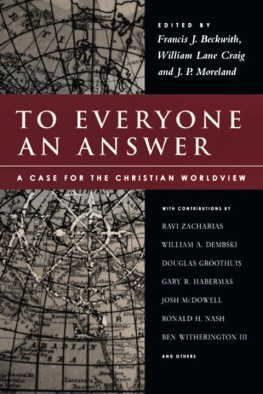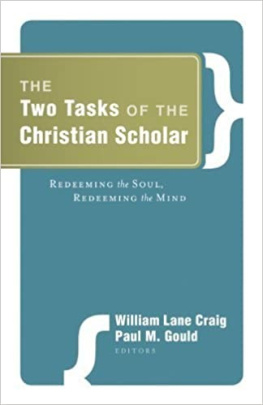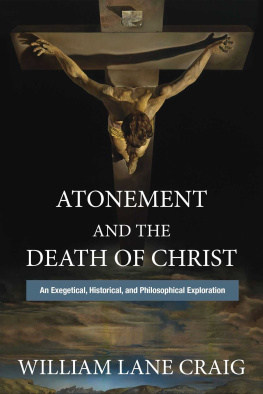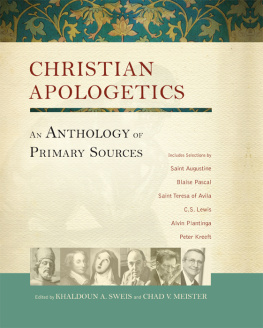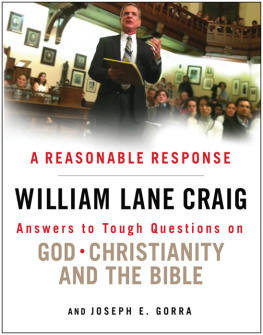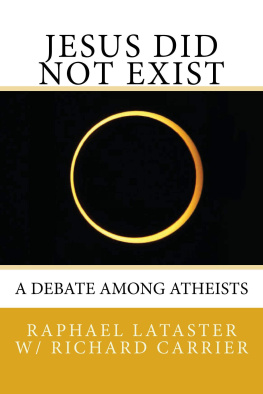Unreasonable Faith
How William Lane Craig Overstates the Case for Christianity
James Fodor
Copyright 2018 James Fodor
All rights reserved. No part of this publication may be reproduced, stored in or introduced into a retrieval system or transmitted in any form or by any means, electronic, mechanical, photocopying, recording or otherwise without prior written permission from the publisher.
Published by Hypatia Press in the United States
ISBN: 978-1-912701-19-3
Cover design by Claire Wood
www.hypatiapress.org
About the Author
James Fodor has a graduate degree in physics from the University of Melbourne, and is a research assistant in structural biology at Monash University. With a keen interest in philosophy, he writes for the Rationalist magazine on various subjects in religion and epistemology. As former president of the University of Melbourne Secular Society, he has engaged in numerous discussions and public debates concerning religion, with a focus on secular morality and the evidence for the resurrection of Jesus. He also has an interest in effective altruism and computational neuroscience.
Synopsis
William Lane Craig is arguably the worlds leading Christian apologist, having engaged in dozens of public debates concerning the existence of God and the resurrection of Jesus, and with a large online following through his Reasonable Faith ministry. Although many philosophers, scientists, and historians have responded to various aspects of Craigs work, a single integrated in-depth response to Craigs apologetic as a whole has hitherto been lacking. This book aims to fill this gap by providing the first book-length critical response to all of Craigs main apologetic arguments, building upon previous responses to develop several new and innovative lines of critique. Craigs much-discussed kalam cosmological argument is considered from both a philosophical and scientific standpoint, integrating previously disparate criticisms developed by scholars such as L. Nathan Oaklander, Quentin Smith, Graham Oppy, and Sean Carroll. It is contended that Craigs argument suffers from a hitherto unappreciated flaw, namely that the very same reasons Craig uses to establish the tensed theory of time (necessary for the kalam to succeed), actually serve to undermine his arguments that the universe began to exist. A similarly novel approach is taken with respect to the fine-tuning argument, where Craigs key assumption that fine-tuning of the universe for life is a well-established scientific fact is shown to be based on an equivocation concerning what type of life is being referred to. The discussion of Craigs moral argument is considerably more comprehensive than any previously published critiques, and focuses on Craigs failure to specify any properties that render God a superior foundation for objective moral values than any of the many non-theistic alternatives developed by philosophers. With regard to Craigs argument for resurrection of Jesus, a new theory is developed to account for the key historical facts without needing to appeal to divine intervention. Drawing upon work by thinkers such as Gerd Ldemann and Richard Carrier, as well as extensive research from sociology, psychology, and comparative religion, it is shown how a combination of hallucinations, memory biases, and social reinforcement could have operated to lead Jesus followers to report seeing the risen Jesus. Written in a clear and accessible style, this book provides a robust and comprehensive response to Craigs arguments for Christianity, and will be of interest to believers and non-believers alike.
Contents
Chapter One
Introduction
The Purpose of This Book
This book does not aim to convert Christians to atheism, or to undermine faith in God. Unlike many of my fellow public atheists, I have no interest in bringing about a general decline in religiosity as such in society. Rather, my purpose in this book is exclusively to evaluate a particular collection of arguments that have been put forward in favour of belief in Christianity. Specifically, I have written this book as a systematic critique of the apologetic work of leading Christian philosopher and apologist William Lane Craig. Though it is all too easy to forget, there is a significant difference between saying that an argument is unsound and asserting that the conclusion of the argument is false. In this book, I make no attempt to disprove or refute the existence of God or the truth of Christianity. My interest in this text is solely in the evaluation of the arguments put forward by Craig.
There are several reasons why I think it is important to carefully consider Craigs arguments. First, these arguments have been widely propagated through both his writings and his many oral debates. The fact that many people hear his arguments and find them (to varying degrees) compelling is itself an important reason for subjecting them to greater scrutiny. Second, a detailed analysis of exactly how and why Craigs arguments fail provides an engaging and important framework in which to sharpen ones critical thinking and analytical skills, and teaches one how to reason about philosophical, scientific, and historical subjects in a more careful, rigorous way than many people are accustomed to. If my readers were to take away nothing more than an enhanced appreciation for and ability to analyse such arguments, I would regard that as a significant success. Finally, and most importantly, Craigs arguments attempt to provide a series of reasons in virtue of which even an atheist or agnostic should, if they are responding rationally, adopt a belief in the truth of certain core Christian doctrines. I, along with many other atheists and agnostics, do not believe that Craigs arguments provide the sort of rational warrant to his conclusions that Craig claims they do. This book, therefore, serves as a means of articulating a rejoinder to Craigs arguments and explains why it is that I do not find his arguments convincing. I do not regard this as a matter of winning points in some sort of intellectual contest, but rather as part of an iterative process of working through a complex set of issues together. As sincere seekers of truth, as I believe we all should be, and given the immense importance of the subject matter under discussion, I regard a careful analysis of Craigs arguments to be a matter of considerable importance.
A Brief Biography of Craig
William Lane Craig was born in 1949 into a non-Christian family in Illinois, USA. Craig first became interested in religion during his teen years, when he began to ponder questions like, why am I here? and where am I going? He tried attending a nearby church, but grew disillusioned with what he considered to be their superficial and hypocritical attitude towards faith. Craigs views regarding Christianity changed dramatically at the age of sixteen, when a Christian classmate told Craig that Jesus loved him. Craig says that he found this idea staggering, and this event therefore marked the beginning of a long period of soul-searching and seeking. As Craig explains:
My spiritual search went on for the next six months. I attended Christian meetings; I read Christian books; I sought God in prayer. Finally, one night I just came to the end of my rope and cried out to God. I cried out all the anger and bitterness that had built up inside me, and at the same time I felt this tremendous infusion of joy, like a balloon being blown up and blown up until it was ready to burst! I remember I rushed outdoorsit was a clear, mid-western, summer night, and you could see the Milky Way stretched from horizon to horizon. As I looked up at the stars, I thought, God! Ive come to know God! That moment changed my whole life. I had thought enough about this message during those six months to realize that if it were really the truthreally the truth then I could do nothing less than spend my entire life spreading this wonderful message among mankind.


